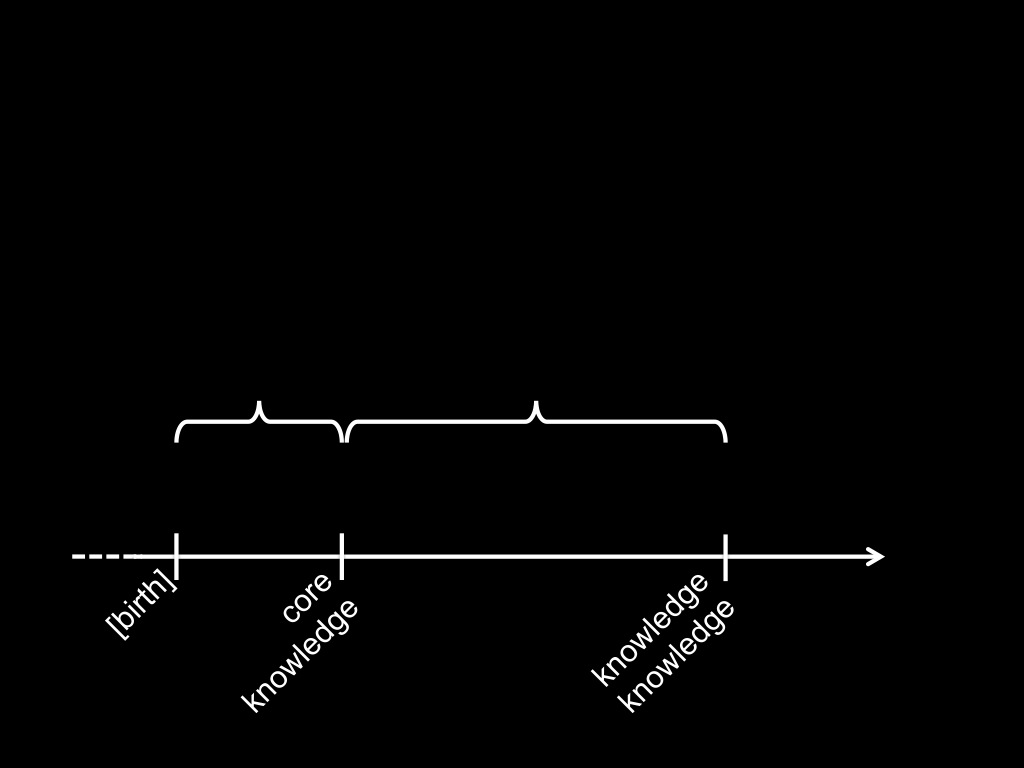Press the right key for the next slide (or swipe left)
also ...
Press the left key to go backwards (or swipe right)
Press n to toggle whether notes are shown (no equivalent if you don't have a keyboard)
Press m or double tap to see a menu of slides
\title {Origins of Mind: Lecture Notes \\ Lecture 09}
\maketitle

Origins of Mind
Lecture 09
s.butterfill@warwick.ac.uk
\def \ititle {Origins of Mind}
\def \isubtitle {Lecture 09}
\
\begin{center}
{\Large
\textbf{\ititle}: \isubtitle
}
\iemail %
\end{center}
\section{Conclusion and Outlook}
\section{Conclusion and Outlook}
\textbf{Question}
How do humans come to know about---and to knowingly manipulate---objects, causes, words, numbers, colours, actions and minds?
the question
Have we made any progress?
case-by-case
If you're wondering what the big idea is, there isn't one.
I think progress depends on approaching it case by case.
For instance, we considered the role of language in two cases, knowledge of colour and knowledge of minds.
It seems to play quite different roles in these two cases.
So while it seems plausible that abilities to communicate by language do play a role in explaining the emergence of knowledge in many domains, it's hard to assign it one role.
There are themes running across the cases but little in the way of general principles.
I'm not saying that's a bad thing; that's just how it is.
core knowledge
Core knowledge is initially a label for a problem.
With respect to various domains of knowledge including colour, physics and psychology, infants have some but not all of the capacities that are characteristic of knowledge.
So we face a dilemma.
The simplest explanation of what they can do would be to ascribe them knowledge.
But ascribing them knowledge systematically generates false predictions about what they will do.
So it must be wrong to ascribe them knowledge.
In the first instance, ‘core knowledge’ (or modular cognition, or implicit knowledge, or tacit knowledge) is just a label for whatever it is that is not knowledge but explains these capacities.
adults, automaticity and limits
Developmental evidence for core knowledge is fragile:
it is always possble that the apparently incorrect predictions can be explained just by appeal to performance factors.
Now as I understand the science many attempts to do this have failed.
But for all we know this may be due only to the limited ingenuity of the researchers.
Reflection on adults provides us with a second line of converging evidence.
To say that a process is automatic is ...
We're looking for two features in adults:
(i) apparent conflict in what the adults know depending on whether the response is automatic or controlled,
and (ii) limits of adults' automatic competence match those of infants'.
We found some evidence this pattern in (a) colour; (b) mindreading; (c) number; (d) maybe causation and physical objects (representational momentum \citep{kozhevnikov:2001_impetus}).

I'm illustrating this pattern with Low & Watts but be careful --- first look is spontaneous but may not reflect automatic processing.



This picture is significantly different from some competitors (but not Carey on number):
(1) because it shows we aren't done when we've explained the acquisition of core knowledge (contra e.g. Leslie, Baillargeon), and
(2) because it shows we can't hope to explain the acquisition of knowledge if we ignore core knowledge (contra e.g. Tomasello)
core knowledge of
- actions
- syntax (?)
- minds
- causal interactions
- physical objects
- colours (?)
- (number)
- (space)
What is core knowledge?
How does it relate to knowledge knowledge?
How does it relate to adult cognition?
How does it relate to nonhumans' cognition?
Core knowlegde: is it all one thing?
Patterns in the mindreading case seem different from patterns in the cases of physics and number.
Most people are committed to there being different stories for (a) colour (categorical perception); (b) syntax (tacit knowledge); and (c) physical objects.
I'm not sure. I'm tempted to think that perceptual and motor cognition are at the root of these in every case, but this is a radical idea for which there is currenly very little evidence.
What is innate in humans?
Conclusive evidence is rare, but that's not really an obstacle.
There's no reason to take radical anti-nativism as our starting point.
This question has two aspects: (i) what sort of thing; (ii) what particulars in which domains.
On (i), I like the idea that core knowledge is innate.
But we should be more careful and say at most that either core knowledge or something capable of priming the acquisition of core knowledge is innate.
On (ii), we looked at a paradigm case, knowledge of syntax.
In this case, we used a poverty of stimulus argument.
While the evidence is less clear in other cases, there is certainly reason to suppose that poverty of stimulus arguments might work for knowledge of colour and knowledge of physical objects.
But I also tried to argue that deciding this question probably isn't very important from our point of view.
social interaction
We've seen that cooperative forms of social interaction appear early in development.
We studied pointing but there are examples involving helping and playing together too.
In seminars we've been considering two ideas:
(i) there is a form of cooperative social interaction abilities to engage in which are important for explaining the origins of knowledge of others' perspectives, for explaining the emergence of abilities to communicate by language, and norms.
(ii) these forms of cooperative social interaction involve a capacity for shared intentionality,
where shared intentionality is understood as the ability to share mental states.

We should characterise the abilities that underpin cooperative social interactions in infancy without appeal to romantic but mysterious ideas about sharing.
Need to re-think what's needed for social interaction if it's to explain things,
And the starting point for this is to reflect on abilities to understand action.
individual:
not
intentions
but
goals
joint:
not
intentions about intentions
but
common goals
core knowledge + social interaction
I like this picture:
core knowledge + social interaction --> abilities to communicate --> knowledge knowledge
Two problems: (i) lack of evidence; (ii) creativity in acquisition of communication by language is hard to square with the prior absence of knowledge knowledge.
I've done one of these pictures for colour and for knowledge of syntax.
This is speculative.
development as rediscovery
Social interaction transforms which abilities core knowledge makes possible, and it is reflection on these abilities and the experiences they case that is the ultimate source of our knowledge.
big idea
Well, maybe there is a big idea after all.
(I'm hesitant to mention this because it's not well established and, anyway, you should find your own big idea. But ...)
Through social interaction you are able to rediscover what is in some sense already encoded in your core knowledge.
That, anyway, is one idea about how humans come to know about objects, causes, minds and the rest.